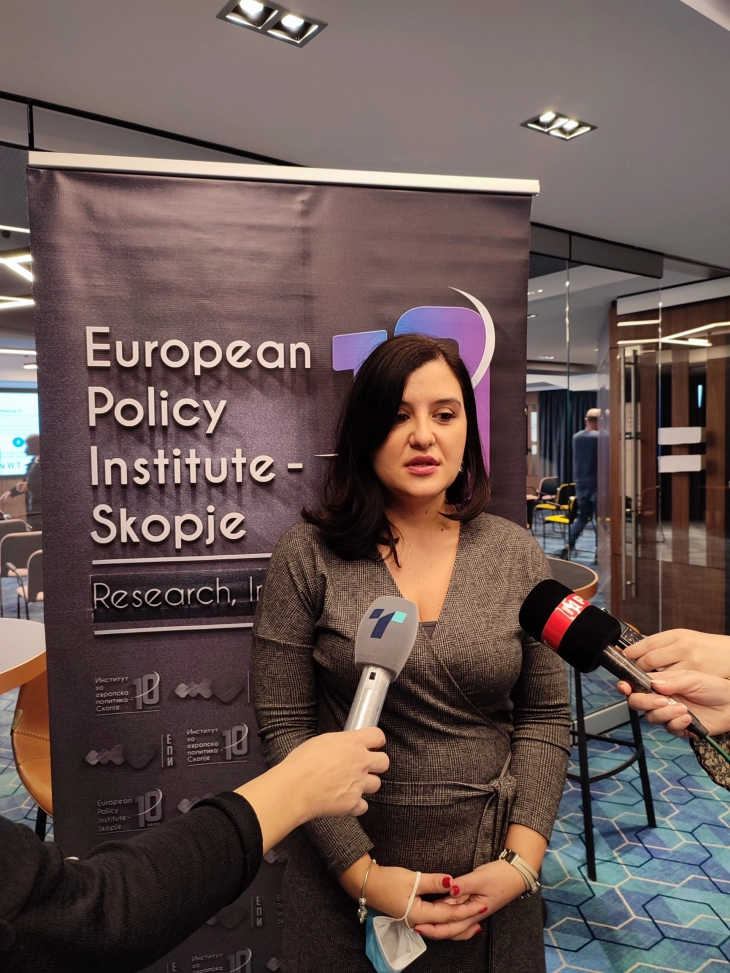Enthusiasm for EU reform agenda weakens without motivation of negotiations, says EPI head

Skopje, 1 December 2021 (MIA) – Without the motivation set to be provided by negotiations, we have a hard time mobilizing and improving the situation at home. We have to set up a strategy of national priorities regarding EU accession, due to the duration of the process. Strengthening administrative capacities and inter-sectoral communication should be among the priorities, European Policy Institute – Skopje (EPI) director Simonida Kacarska said on Wednesday.
“Without the motivation set to be provided by negotiations, we have a hard time mobilizing and improving the situation at home. We recommend making better use of the Stabilization and Association Agreement, as an instrument that still represents a legal framework between North Macedonia and the region in regard to relations with the EU. It defines relations at a formal level and we have to focus on the opportunities this process offers. On the other hand, we recommend long-term planning and setting up a strategy of national priorities at short and mid-term level, due to the duration of the process,” Kacarska told reporters at Wednesday’s conference “In between the reports, progress and alignment – How to ensure that the process of adoption of the EU acquis is substantial and sustainable?” organized by the EPI.
In regard to chapters and meeting political criteria, Kacarska noted that these have been grouped in the cluster Fundamentals, which also contains new areas such as functioning of democratic institutions and public administration reform. However, it’s still unclear how the EC will assess these, so it’s important that we have our own agenda.
“This year, the Commission released a set of possible indicators, but it’s also likely to use other indicators, that we are not aware of yet. Therefore, it’s very important we create our own agenda. The situation in the judiciary is good. We started from the beginning, but it’s crucial we now prioritize the process, Kacarska said, adding that the Commission is recommending start of negotiations.
According to her, despite the cluster Fundamentals, capacities are weakening, as is coordination, especially in regard to using EU funds and investing in administrative capacities set to lead this long process.
“Strengthening the capacity of intersectoral communication should be a top priority. EU doesn’t function in isolation, but through public policies, which require coordination between institutions,” Kacarska noted.
Regarding weakened enthusiasm for implementation of reforms, due to the unpredictability of the start of negotiations, as a results of the Bulgarian veto and the upcoming French EU Presidency, she reiterated the importance of a national long-term strategy that won’t be tied to any deadlines.
“We must set priorities in the context of EU accession and a national agenda complementary to the EU one. It will be hard, but if we want to establish a strategy for where we want to see our society in a certain period of time, we must do it. It would have been good if we could wrap up the process in seven years like others have done, but we don’t have that option. We have to face reality and set up a long-term concept,” said the EPI director.
The EPI is presenting on Wednesday its annual analysis of the EC’s report on North Macedonia. Focus is being put at the conference on chapters regarding food safety and customs, crucial in the accession process.
Participants in the event include representatives of working groups by chapters for the adoption of the EU acquis, representatives of the Secretariat for European Affairs, civil society organizations, academia and independent experts, as well as representatives of the EU Delegation and of EU member states and candidate countries.
According to the EPI, the objectives of the event are to enable dialogue at a professional level on good practices, weaknesses and challenges in the process of adoption of the EU acquis, to identify the factors that affect the dynamics and quality of the adoption of the EU acquis, and to give recommendations for improving the content and mechanisms of the EU accession process.







